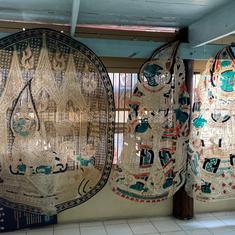It was 1981. The Falklands War was a year away from fully escalating. Queen had just released a studio album called The Game. One of the songs, Another One Bites The Dust, had the world on its feet, so much so that 300,000 people turned up at the Estadio Velez Sarsfield in Buenos Aires to watch the band live.
On the last leg of that tour, a 20-year-old Diego Maradona met Freddie Mercury wearing the colours of the United Kingdom’s Union Jack. In turn, Mercury wore the colours of Argentina. There are photos from that meeting, showing Mercury at his peak, arms wide open in one picture, almost as if welcoming the world to Maradona’s eccentric genius.
One can almost smell the charge in that room, like a burning fuse attached to dynamite. A fuse made of struggle, of being different, of being able to express their madness through art. One’s songs did the talking, the other’s feet would do the same. In five years’ time, Maradona exploded onto the World Cup: unpredictable and devastating like gunpowder, the impact of which will go far beyond the 60 years that Maradona lived for, just like Mercury’s does when he sings “Is this the real life? Is this just fantasy?”
I’ve never seen Maradona play. The only time I did see him was when he was manager of Argentina at the 2010 World Cup.
They were playing against South Korea and a wayward clearance came to him on the touchline, as if the ball was moved there by the collective will of those watching. Just to see him touch it. Maradona stuck out his left leg, used the outside of his boot - as he regularly did - to cushion the ball while he was pointing an instruction to his players.
Just like when Gary Linekar once spoke of how Maradona did keepy uppies with his left while he wore socks on the right foot. The cheer was louder than any other moment provided in that 4-1 win for Argentina.
England legend Gary Lineker recounts an amazing anecdote about #DiegoMaradona's skills.
— The Field (@thefield_in) November 25, 2020
🎥 BT Sportpic.twitter.com/0lzE1wpCdI
Lionel Messi was also on the pitch that day, still young in the impossible task of providing a nation with the next Maradona. But the better Messi got, the more similarities of greatness he showed, the farther he got from becoming the next Don Diego. And it isn’t Messi’s fault that he was born in times which required footballers to be perfect.
Maradona’s legacy is hard to match because he was the opposite of that: he was imperfect. His moments of glory are etched with real pain, his masterclasses peppered with moments of cheating. He dropped defenders dead one minute, and stared wild-eyed into the camera the next, high on his own talent and narcotics. He scored with his hand one moment, and followed it up in the same match with the goal of the century. And he embraced this imperfection.
While Messi is called an alien in the most positive sense of the word, Maradona was seen as human. He was, as he once himself said, “normal.” Or maybe he lied, because he was God. Or he was somewhere in between. Only he knows.
Born to rebel
Maradona’s struggles with chemical enhancement may have started at a young age when he was given supplements and injections to help him grow. He was so malnutritioned it was hard to believe he was as old as he claimed to be when he first stepped into professional football. He was poor, he was against the odds. And most of all, he was a rebel who wore his heart on his sleeve.
People took advantage of this innocence, especially during his time in Italy, when he was hooked to cocaine, which ironically promises to make you feel larger than life. It makes you wonder whether he really needed that. But the stained parts of his legend will always be a clue pointing towards the cultural roots he came from.
He’s also one of the very few footballers to make most millennials in love with the game wish they were born two decades or so earlier. His mythical stature means it is hard to not be affected by his passing, even if you never saw him play. If you did, know that the world envies you.
Maradona’s passing brings a sense of sadness, but also that of relief. Relief that he has gone someplace beyond mere mortals, where he belongs, bouncing in the clouds.
While silverware should hardly define the greatness of a player, he goes with the World Cup and unthinkable titles with Napoli.
When he was alive, he was vapour and water on dogged pitches, he was the sound of an urchin’s scampering feet, who would trick you and run away, leaving only a trail of laughter.
In an era of heavy footballs and unforgivable tackles, he taught us how to forgive. So when you miss him, know that Don Diego is still flitting and twisting in the air like a spirit. Eternally imperfect.










